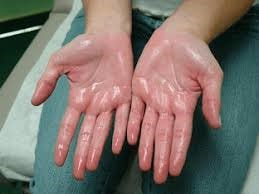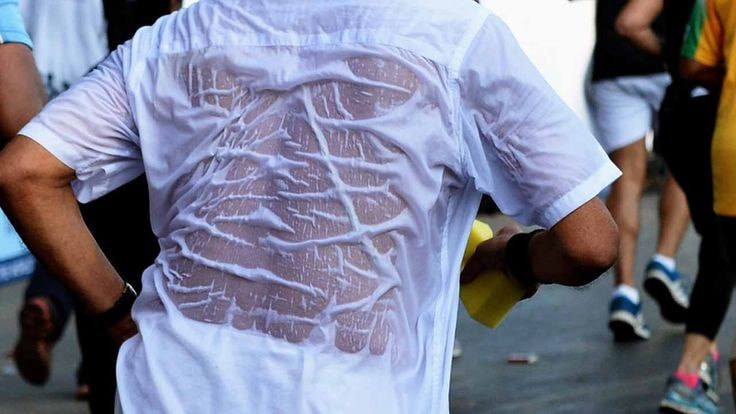 Sweaty Palms Forbade Even a Handshake Sweaty Palms Forbade Even a Handshake Are you the type of person who avoids handshakes during meetings, dreads a sleepover party with friends during summer or hesitates to show off your pedicured legs wearing flip-flops due to sweating? That’s common and there’s nothing to worry about much. Sweating is one way of cooling the body and prevent it from overheating. People generally sweat on a hot day or while exercising or even when they are nervous sometimes. The same reaction when it happens when your body does not need to cool down can cause excessive sweating. Excessive sweating can happen without any reason, as a side effect of medication or because of another condition that you might have. Medically termed as hyperhidrosis, this is a condition where the body sweats when there is no need of cooling down. This is not a dangerous or life-threatening condition but can cause embarrassment, discomfort and affect the individual psychologically. Hyperhidrosis Excessive sweating generally happens in the hands, feet, armpits and groin due to excessive sweat glands present. When these glands are localized it is called focal hyperhidrosis (such as sweating on the palms and soles) and excessive sweating that happens throughout the body is called as generalized hyperhidrosis. The condition might be present since birth or develop later in life. The most common time during which hyperhidrosis starts to happen is adolescence. While the condition is treatable, many individuals fail to seek solutions out of embarrassment or due to the lack of knowledge about effective treatments. Symptoms Bouts of excessive sweating occur at least once a week accompanied by symptoms such as:
Causes While causes of primary hyperhidrosis was believed to be anxiety, stress or nervousness until now, recent research proves that it is the other way round-excessive sweating can cause mental and emotional trauma, anxiety and stress in these individuals. Some studies do indicate the presence of a gene that might be responsible for the condition making it likelier to be inherited. Also, most of the patients with primary hyperhidrosis have a sibling or parent with the condition. Certain nerves in the body trigger sweating and it is possible that when these nerves overreact, it causes excessive sweating. Causes of secondary hyperhidrosis are clearly defined and include spinal cord injury, gout, anxiety, diabetes, heart disease, obesity, pregnancy, respiratory failure, shingles, hyperthyroidism, infections such as HIV, malaria and TB, substance abuse and certain medications. Get a detailed explanation of each of these conditions and analyze their effect on your body from the website www.firsteatright.com. Irrespective of whether you live in a hot or cold climate, you can be prone to hyperhidrosis. Treatment Before starting the patient on any treatment, it is necessary to diagnose the problem accurately. The physician initially does a physical examination of the areas that sweat profusely and asks specific questions that helps the doctor understand why the patient is having the condition. Sometimes, the physician physically checks the patient by coating their skin with a powder that changes color (purple) when the person starts sweating. Treatment depends on the type of hyperhidrosis and the part of the body that sweats excessively. The physician might recommend that the patient meets a dermatologist for getting treated. The dermatologist suggests medications to reduce sweat. Botox treatment might also be suggested which reduces sweating for at least 4-6 months and this can be repeated. When none of the treatments work, the surgeon might suggest surgery as the final remedy. The sweat glands are permanently removed or stop the nerve signals from sending message to the sweat glands to secrete sweat (sympathectomy). Any surgery carries a certain dose of risk and side effects. Meeting a dermatologist can help you seek effective treatments and control excess sweating which improve quality of life. Certain modifications in lifestyle may improve symptoms:
Comments are closed.
|
AVOID FRAUD. EAT SMART.+91 7846 800 800
AuthorDietitian & Nutritionist Dr. Nafeesa Imteyaz. Archives
July 2024
Categories
All
Dr. Nafeesa's Blog @blogspot |
- Home
- Written Testimonials
- Consult
- Clinics
- Blogs
-
Diet & Nutrition
- Diabetes Reversal
- IVF IUI not needed for PCOS PCOD Infertility
-
Medical Nutrition
>
-
Disease & Conditions
>
- Infertility | PCOS
- Diabetes Mellitus
- Cholesterol
- Hypothyroid
- Kidney Problems
- Hypertension
- Cardiovascular Diseases
- Liver Diseases
- Gastro intestinal disorder
- Cancer
- Metabolic Disorders
- Orthopedic Disorders
- Eating Disorders
- Dietary Recall
- Weight Record Filled By Clients
- Online Payment Transaction Details
- Online Clients Weight Check Form
- Our Program Package Service Charges
- Weight Record 2017 Clients
- Measurements sent by Clients
- Terms & Conditions Of Payment
- Thanks. Your Form is Submitted
- Video Testimonials
- Lifestyle & Wellness
- Lifestyle & Wellness Blog
- Allergy & Intolerance
- Weight Loss / Gain
- Weight Loss / Slimming Blog
-
Disease & Conditions
>
- Life Cycle Nutrition >
- Sports Nutrition >
- Integrity in Nutrition
- Knowledge Centre
© COPYRIGHT 2022. ALL RIGHTS RESERVED. FRST HEALTHCARE PVT LTD.
Dr. Nafeesa Imteyaz of First Eat Right clinic, is the Best Dietitian Nutritionist in Bangalore. Best Dietitian Nutritionist in Pune. Best Dietitian Nutritionist in Hyderabad. Best Dietitian Nutritionist in Chennai. Best Dietitian Nutritionist in Mumbai. Best Dietitian Nutritionist in Delhi. Best Dietitian Nutritionist in Kolkata.


